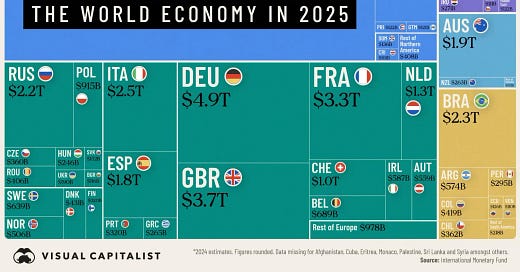The Sunday Brew #128
In this brew - 2025 World Economy Outlook | Preference Falsification & Dysrationalia | Harvard not to admit foreign students, Google I/O 2025, India denies US mediation in ceasefire
Welcome to The Sunday Brew, weekly 1-2-3 newsletter by The Percolator. Every Sunday we drop in your inbox 1 story in a picture, 2 concepts, ideas or frameworks to expand your horizons and 3 news from the week, to keep you updated.
If you are not a paid subscriber, here is what you missed last week:
ONE STORY IN A PICTURE
TWO IDEAS, FRAMEWORKS OR CONCEPTS
This week we bring to you two concepts - Preference Falsification & Dysrationalia
Preference Falsification
Preference falsification describes the act of concealing one’s genuine beliefs or desires under social, political, or cultural pressure, instead expressing opinions perceived as more acceptable.
Coined by economist Timur Kuran, this phenomenon highlights the divergence between private preferences and public declarations, often driven by fear of ostracism, punishment, or the desire for social approval. Individuals may suppress dissenting views to align with dominant narratives, creating a façade of consensus that reinforces existing power structures or societal norms.
This behaviour is pervasive across contexts. In authoritarian regimes, citizens might outwardly endorse leaders while privately opposing them, fearing reprisal. In democracies, people might avoid controversial stances on issues like immigration or climate policy to evade backlash. Over time, widespread preference falsification distorts public discourse, fostering pluralistic ignorance—a collective misperception where individuals assume others genuinely support norms they privately reject. This can entrench harmful practices, such as discriminatory traditions, as dissent remains unvoiced.
The consequences are profound. While surface-level conformity may stabilise societies temporarily, it masks underlying discontent, potentially leading to sudden upheavals when suppressed dissent erupts, as seen in revolutions like the 1989 Eastern European uprisings. It also skews policymaking, as leaders rely on distorted public signals. For instance, governments might maintain unpopular policies due to inflated perceptions of support.
Preference falsification underscores the complex interplay between individual autonomy and social influence. It reveals how fear and conformity shape collective behaviour, often sustaining systems of control or inequality.
🚀
Dysrationalia
Dysrationalia describes the gap between intelligence and rational decision-making, where individuals with strong cognitive abilities consistently make poor judgments despite having the mental capacity to know better.
Coined by psychologist Keith Stanovich in the 1990s, the term highlights how standard measures of intelligence (e.g., IQ tests) often fail to capture critical thinking skills, leading to a paradox: smart people acting against their own interests or evidence. Unlike intellectual disability, dysrationalia stems not from low intelligence but from systematic errors in reasoning, such as cognitive biases, emotional interference, or flawed heuristics.
Common examples include clinging to superstitions, dismissing scientific consensus, or making impulsive financial choices. A highly educated person might reject climate change due to ideological allegiance, or a skilled professional might gamble savings on speculative investments. These behaviours often arise from ingrained biases like confirmation bias (favouring information that aligns with pre-existing beliefs) or the sunk-cost fallacy (persisting with failing endeavours due to prior investment). Emotional factors, such as fear or overconfidence, further distort logical analysis.
Dysrationalia has broad societal implications. It fuels misinformation spread, polarises public discourse, and perpetuates harmful practices, from pseudoscientific health trends to poor policy support. For instance, anti-vaccine movements often attract intelligent individuals who misinterpret data or distrust institutions. The phenomenon also exposes flaws in education systems that prioritise rote learning over critical thinking, leaving even "bright" minds unequipped to navigate complex, ambiguous scenarios.
Addressing dysrationalia involves cultivating metacognition—awareness of one’s thinking processes—and teaching deliberate reasoning strategies. Encouraging intellectual humility, probabilistic reasoning, and scepticism of intuitive judgements can mitigate irrational tendencies.
THREE NEWS FROM THE WEEK
Trump Administration Revokes Harvard’s Licence to Admit Foreign Students
The Trump administration has revoked Harvard University’s authority to admit international students, forcing nearly 7,000 foreign students to transfer or risk losing their legal status in the United States.
The unprecedented move, announced Thursday by Homeland Security Secretary Kristi Noem, strips Harvard of its certification under the Student and Exchange Visitor Program for the 2025-26 academic year, citing alleged noncompliance with federal requirements.
Noem accused Harvard of “encouraging violence, anti-semitism, and collaborating with the Chinese Communist Party,” claims the university has strongly denied. The administration’s action follows Harvard’s refusal to provide extensive records on its international students and comes amid a broader White House campaign demanding changes to university hiring, admissions, and teaching practices to combat anti-semitism.
Harvard, which draws students from over 140 countries, condemned the decision as “unlawful” and “retaliatory,” warning that it undermines both the university’s academic mission and the nation’s standing as a global leader in research and education. “This retaliatory measure poses a significant threat to the Harvard community and our country,” the university stated, vowing to support affected students and challenge the order.
The administration’s crackdown could set a precedent for other institutions, with officials warning that similar actions may be taken nationwide. The White House has also threatened to revoke Harvard’s tax-exempt status and freeze billions in federal grants if the university fails to comply with its demands.
The move has thrown thousands of students’ futures into uncertainty and sparked widespread condemnation from academic and legal circles, who see it as an attack on higher education’s independence and international character.
➖
Google I/O 2025: AI Takes Centre Stage with Gemini Upgrades and Bold New Tools
Google I/O 2025 concluded this week with a clear message: artificial intelligence is now at the heart of Google’s strategy, powering a wave of new features and products across its ecosystem. The company’s annual developer conference, held at the Shoreline Amphitheatre in Mountain View, showcased the latest advancements in its Gemini AI models, including the debut of Gemini 2.5 Pro’s “Deep Think” mode, designed for complex reasoning in maths and coding, which is now available to select testers via the Gemini API.
AI Mode in Google Search, previously experimental, is rolling out to all US users, promising more personalised and context-aware results by tapping into users’ Gmail data and offering new tools like custom chart creation and agentic capabilities that can handle tasks such as booking tickets or making reservations directly from search queries. Shopping has also been revamped, with a new virtual try-on feature and the ability to complete purchases via Google Pay through AI-powered recommendations.
The conference also saw the introduction of Gemini Ultra, a premium subscription tier offering advanced AI tools, including the Veo 3 video generator, Flow video editing app, and expanded storage and productivity features for $249.99 per month in the US. Google’s Workspace suite is set to benefit from AI-powered smart replies, inbox clean-up, and real-time speech translation in Meet, while creative professionals can look forward to new generative tools in Docs, Slides, and the freshly announced Google Flow filmmaking platform.
With over 400 million active users now on the Gemini app and AI-driven features expanding into every corner of Google’s ecosystem, I/O 2025 marks a decisive shift towards a more intelligent, personalised, and action-oriented future for the company’s products.
➖
India’s Foreign Minister Denies Trump or US Mediation in Operation Sindoor Ceasefire
India’s External Affairs Minister S Jaishankar has categorically denied claims that former US President Donald Trump or any US officials played a mediating role in the recent ceasefire between India and Pakistan following Operation Sindoor. The denial comes after Trump publicly suggested he was instrumental in brokering the truce, a claim India has firmly rejected.
Speaking to international media, Jaishankar emphasised that the cessation of hostilities was the outcome of direct, bilateral negotiations between Indian and Pakistani military officials, not the result of any external intervention. “The US was in the United States,” Jaishankar remarked pointedly, adding that while American officials did reach out during the crisis, India made it clear that any engagement with Pakistan would be strictly bilateral.
Operation Sindoor was launched by India in response to a deadly terror attack in Jammu and Kashmir’s Pahalgam on 22 April, which killed 26 civilians. The Indian military targeted several terror sites in Pakistan and Pakistan-occupied Kashmir, prompting retaliatory fire from across the border. According to Jaishankar, the ceasefire was initiated after Pakistan’s military contacted their Indian counterparts via the official hotline, expressing readiness to halt firing. India responded in kind, leading to a mutual agreement to cease hostilities effective 10 May.
Despite diplomatic outreach from the US and other countries, Indian officials have reiterated their long-standing policy that all matters with Pakistan, including ceasefire arrangements, must be resolved bilaterally. The Ministry of External Affairs has repeatedly stated there was no foreign mediation, and no discussions on trade or other issues with the US during Operation Sindoor.
India’s position remains clear: talks and terror cannot go together, and the country will continue to respond decisively to cross-border terrorism, independent of outside involvement.
The Sunday Brew by The Percolator brings to you curated news on tech, business & entrepreneurship, from across the internet to give your week a perfect start.
Share your thoughts and opinions on the topics covered in this newsletter by leaving a comment and joining the conversation.








